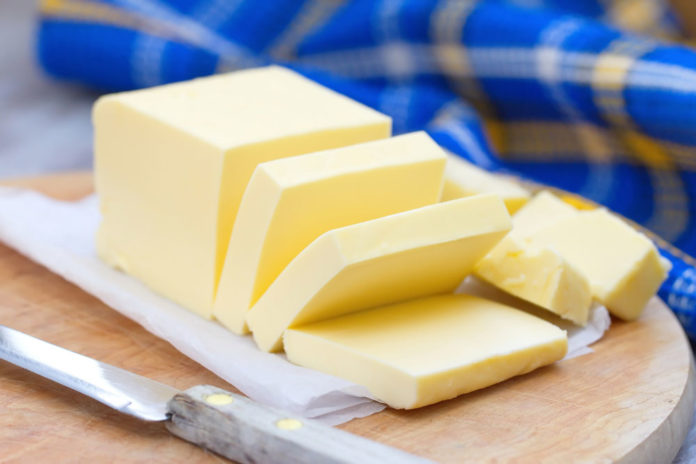Limiting butter use has been a suggested health recommendation to reduce the risk of weight gain and associated chronic diseases. And though butter can fit into a well-balanced diet in moderated amounts, butter substitutes may provide the body with further benefits. Try these butter substitutes to not only enrich the nutritional content, but deepen the flavor and/or texture of products much like its relative counterpart!
Oils
1. Olive Oil
From heart health to diabetic control, olive oil boasts with benefits. Replace butter in products to not only offer health benefits, but to enhance the tastes of salad dressings, pasta sauces, sautéed veggies, grilled chicken, and the list goes on. Additionally, brands such as Smart Balance offer an extra virgin olive oil butter spread, free of hydrogenated or partially hydrogenated oils with zero grams of trans fats!
2. Canola Oil
Canola oil is in the same ballpark as olive oil, rich in omega-3 fatty acids and cuts down on saturated fat. The nutrition composition of canola oil also resembles olive oil, and extremely versatile, with use in sautéing, salad dressings, coating non-stick pans, and swapping out butter in recipes. Canola oil-based butter spreads are also available in most grocery stores.
3. Coconut Oil
Although coconut oil is a saturated fat like butter, coconut oil contains a medium-chain triglyceride (MCT) oil shown to increase good cholesterol levels and promote heart health. It further offers antimicrobial and antiviral properties and can be used in equal amounts at a 1:1, butter to coconut, ratio.
Fruits
4. Applesauce
Cut butter use in half (or more!) with applesauce. In baked products using butter, split the amount indicated with applesauce and butter. For instance, if calling for a ½ cup of butter, use a ¼ cup butter and ¼ cup applesauce. Additionally, feel free to use greater portions of applesauce and lesser amounts of butter as preferred. Utilizing applesauce significantly reduces fat content while creating a moist product. Use unsweetened applesauce to further cut down on sugar content. Utilizing applesauce is a great butter substitute for cookies, as witnessed in these Puffed Up Chocolate Chip Cookies, suggesting only a ¼ cup of butter compared to most cookie recipes using a stick or cup or two of butter.
5. Pumpkin Puree
Much like applesauce, split the suggested butter amount in half – if a recipe calls for a cup of butter, use ½ cup butter and a ½ cup of pumpkin puree. Replacing butter completely is up to the baker’s discretion. If feeling extra motivated, prepare this simple, homemade pumpkin puree recipe!
6. Prune Puree
Though prunes are known for their laxative effects, it can further be used as a butter substitute in baking and additional sweetened products. Create one cup of prune puree by pulsing one cup of prunes in a food processer with six tablespoons of hot water, mixing until smooth. The puree is recommended to replace half the butter or oil into baked products, such as in this healthified brownie recipe.
7. Bananas
Bananas overripe? Take this opportunity to reduce fat content while incorporating natural sweetness and nutrients into baked goods. Mashed bananas can fully replace butter content – if a recipe calls for one cup of butter, pack one cup of mashed banana. Importantly, though, products utilizing mashed banana will offer a banana flavor but valuably compliments muffins, cookies, and spiced breads, including this healthier banana bread.
8. Avocado
Top your next slice of whole grain toast or sprouted bagel with avocado! Swapping out butter with avocado is a healthful opportunity to obtain recognized, healthful monounsaturated fat while limiting saturated fat. MUFAs have shown to offer the body with heart-healthy benefits.
Dairy
9. Greek Yogurt
Swapping out butter with Greek yogurt is a simple way to limit fat while amplifying protein content, as one cup offers 13 grams on average! In baked goods, half the butter amount and replace with the yogurt. Ixnay the butter in mashed potatoes with Greek yogurt, too!
Nuts and Seeds
10. Nut Butter
Do you use a few pats of butter in your oats? Use a nut butter to enrich flavor and nutritional content of those morning grains! When choosing any type of nut butter, pay attention to the ingredient label. Many product brands add unwanted oils and sugars to the butter, ultimately compromising its healthfulness. Look for nut butters that contain solely the nut itself, though a small amount of added salt is permitted.
11. Sunflower Butter
The use of sunflower butter resembles much like nut butter. Sunflower seeds provide rich nutrients, including vitamins E and B-1 and copper. Their nutritional profile ultimately suggests their use promotes heart health and may reduce the risk of diabetes. Like nut butter, be wary of added oils and sugars in commercial products.






